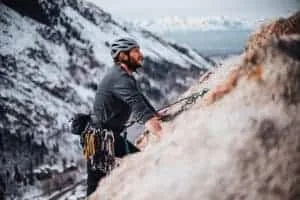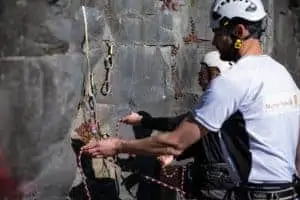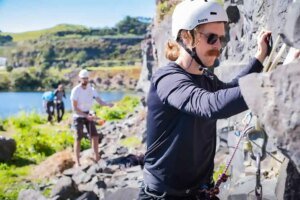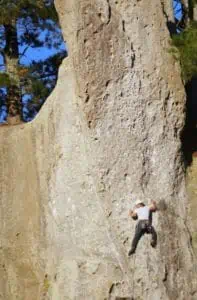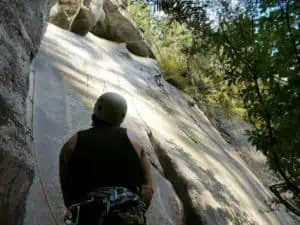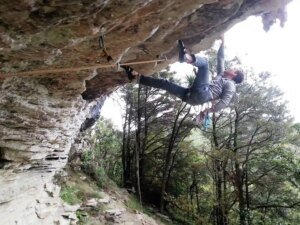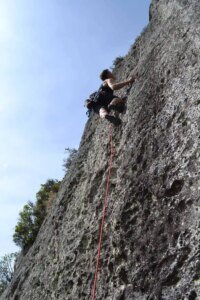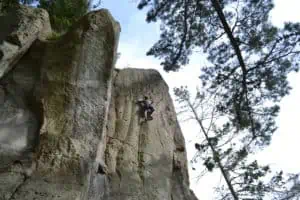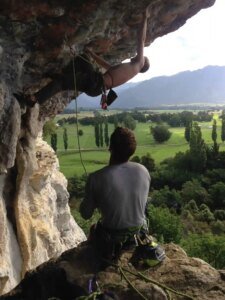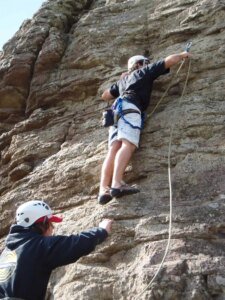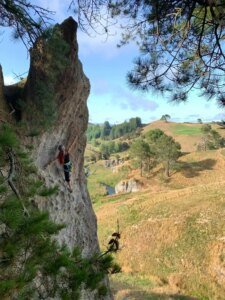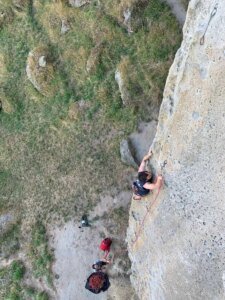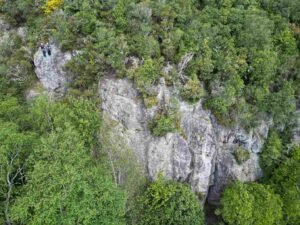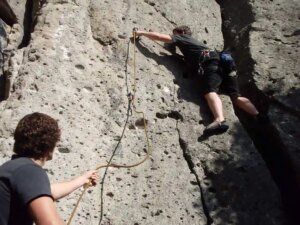Outdoor lead climbing courses provide climbers with the necessary skills and knowledge to lead climb on natural rock formations. Participants learn advanced techniques for placing protection, managing gear, and navigating outdoor climbing routes. These courses emphasize safety, risk assessment, and building confidence in leading climbs in real-world outdoor environments
It is and intermediate form of Outdoor Rock Climbing known also as ‘Sport’-Climbing. Clipping bolts with a quickdraw and leading the rope up as you go. These courses are ideal for people with some previous climbing experience who want to take the sport to the next level.
Maybe you are an indoor sport climber wanting to learn the next step and climb safely outdoors? Come and experience a full day’s sport lead climbing course with us! Grab your climbing partner or join our groups and come learn the fundamentals of lead rock climbing on bolted sport routes, with some of New Zealand’s highest qualified instructors.
Learn the best practices to safely lead climbs, with the added bonus of improving your climbing.
To see us in action, click here ![]()
The Social Nature Movement team offers you the choice and flexibility to choose your duration of sport climbing.
We have options for a days lead climbing, two days/overnight, four days and seven days of sport climbing.
Our lead climbing options are for anyone wanting to start sport climbing, get guided around, learn more about skills and knowledge or simply spend time in nature and lead climb as much as possible with a guide on your side.
During our sessions, it is likely you will experience falling; the scariest part of sport climbing. Though we have safe and subtle progressions making this less scary and teaching you ways to manage fear and decrease risk. Push yourself mentally and physically by learning to lead climb in New Zealand’s premier (and most scenic) sport climbing venues.
This course teaches the essentials for leading bolted sport routes. It is also a must do for people needing to go beyond learning from a friend; to check they are using good and safe techniques.
If you have lead climbed before, our instructors will check what you already know. Don’t worry if you don’t have any equipment – we can provide it all, however you are welcome to use your own if you have it, so you can learn to use your own sport climbing equipment safely.
Push your grade and fill those gaps which may be in your technical repertoire such as anchor building or rescue techniques. Having a concentrated burst of climbing with professional instructors can let you step up to a new level of skill.
Learn skills and attain knowledge to demonstrate your experience in lead climbing for others:
Want to get better at lead climbing? This thrilling discipline allows climbers to ascend routes while placing their own protection, combining physical strength with technical skill and mental resilience. Focusing on essential techniques like gear management, route navigation, and risk assessment is vital for enhancing your confidence and performance on the rock.
At Social Nature Movement, we offer specialised outdoor lead climbing courses tailored to climbers of various skill levels. Our courses provide hands-on experience with placing protection and understanding the dynamics of lead rope climbing in a natural setting. Under the guidance of our skilled instructors, participants learn how to assess risks and make informed decisions while climbing. This thorough approach ensures that you gain practical knowledge that is directly applicable to real-world climbing scenarios.
By joining our lead climbing course, you will not only develop your climbing techniques but also connect with a community of like-minded individuals who share your passion for the outdoors. Our supportive environment encourages climbers to challenge themselves while ensuring safety at all times. For more information about our outdoor lead climbing courses and to book your spot, visit the Social Nature Movement website today.
Check out our booking tab, click the book now button or fill an enquiry here.
Technical Competence in Sport Climbing that participants will gain:
1. Sport Climbing History and Ethics:
2. Correct Equipment Usage:
3. Anchor Systems Construction:
4. Top Rope System Construction:
5. Climbing Techniques Display:
6. Belaying Techniques Demonstration:
7. Rescue Skills Display:
8. Environmental Practices:
9. Cultural and Environmental Knowledge:
10. Group Management and Leadership:
This comprehensive Sport Climbing syllabus focuses on developing technical competence and leadership skills. From history and ethics to equipment usage, climbing techniques, safety management, and environmental responsibility, this qualification ensures a holistic approach to sport climbing education.
This changes depending on what we do and where we go, but generic items are:
Clothing
Equipment
If we are staying overnight, should you choose not to be accommodated and fed by us, here is what you will need:
Sleeping
Cooking
New Zealand Outdoor Instructors Association (NZOIA)
Lead climbing is not that hard, most people can learn how to lead climb with good progressions and quality instructors.
To get better at lead climbing one should seek professional assistance from a lead climbing instructor and go out wiht them to practice.
For beginner lead climbers, seek a professional lead climbing course.
No, because you need a lead belayer. Without one it is called free solo or rope solo climbing.
Rock climbing is harder for beginners who struggle with fear of heights, while bouldering is more of a challenge for beginners who lack finger and upper-body strength.
Like mock lead climbing, the best way to practice lead belaying is to have the climber still attached to a top rope, meaning that you will need a third person. With the climber secured to a top rope, the mock lead belayer can practice feeding slack without the pressure of catching the climber if they fall.
Z-clipping is when you clip the rope to your next bolt from below your last bolt or gear. This is most common on routes with bolts closely spaced and when the climber grabs blindly below their waist for the rope to make the next clip.
Lead climbing is relatively safe, it is as safe as the two people lead climbing and lead belaying. Accidents will usually occur due to user-error
We select the best staff for the job based on their skills, knolwedge and experiences. They will be an SNM staff member or we will bring in support from equally competent contractors. Sometimes we also bring in (semi)celebrity guests!
What are the costs?
1 day lead climbing
Adult $300
Child $270
2 days lead climbing
Adult $550
Child $500
4 days lead climbing
Adult $1,000
Child $900
7 days lead climbing
Adult $1,650
Child $1,485
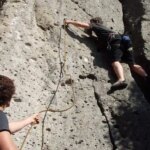
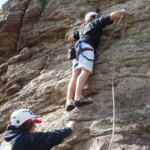
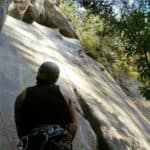

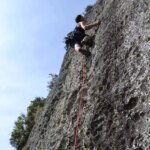
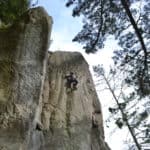

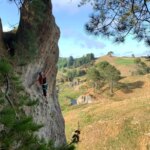

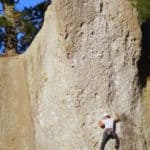
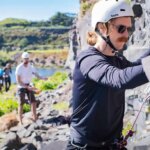
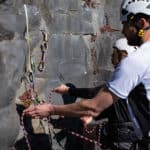
Outdoor lead climbing courses provide climbers with the necessary skills and knowledge to lead climb on natural rock formations. Participants learn advanced techniques for placing protection, managing gear, and navigating outdoor climbing routes. These courses emphasize safety, risk assessment, and building confidence in leading climbs in real-world outdoor environments
It is and intermediate form of Outdoor Rock Climbing known also as ‘Sport’-Climbing. Clipping bolts with a quickdraw and leading the rope up as you go. These courses are ideal for people with some previous climbing experience who want to take the sport to the next level.
Maybe you are an indoor sport climber wanting to learn the next step and climb safely outdoors? Come and experience a full day’s sport lead climbing course with us! Grab your climbing partner or join our groups and come learn the fundamentals of lead rock climbing on bolted sport routes, with some of New Zealand’s highest qualified instructors.
Learn the best practices to safely lead climbs, with the added bonus of improving your climbing.
To see us in action, click here
The Social Nature Movement team offers you the choice and flexibility to choose your duration of sport climbing.
We have options for a days lead climbing, two days/overnight, four days and seven days of sport climbing. /
Our lead climbing options are for anyone wanting to start sport climbing, get guided around, learn more about skills and knowledge or simply spend time in nature and lead climb as much as possible with a guide on your side.
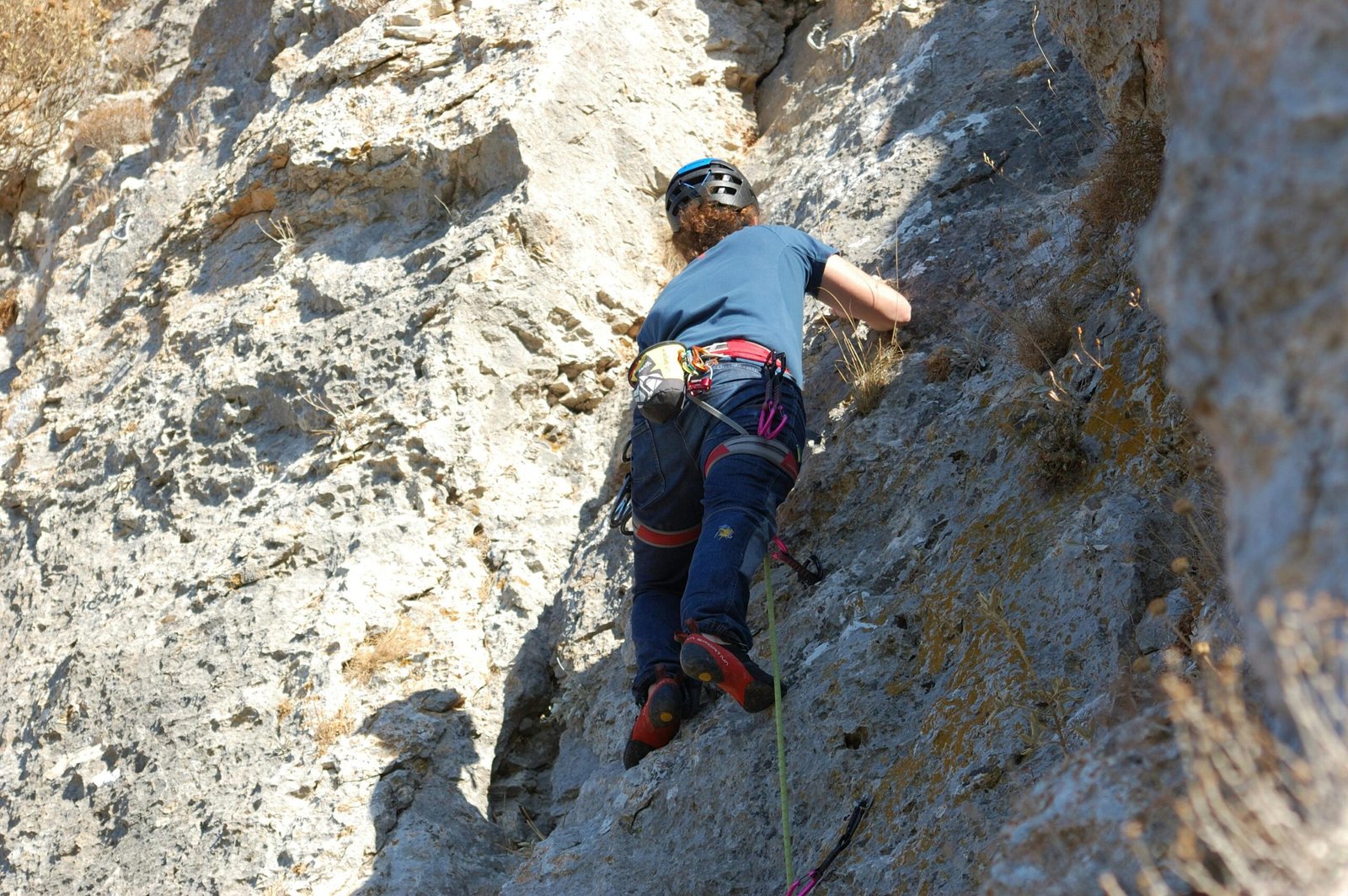
Sport Climbing
During our sessions, it is likely you will experience falling; the scariest part of sport climbing. Though we have safe and subtle progressions making this less scary and teaching you ways to manage fear and decrease risk. Push yourself mentally and physically by learning to lead climb in New Zealand’s premier (and most scenic) sport climbing venues.
This course teaches the essentials for leading bolted sport routes. It is also a must do for people needing to go beyond learning from a friend; to check they are using good and safe techniques.
If you have lead climbed before, our instructors will check what you already know. Don’t worry if you don’t have any equipment – we can provide it all, however you are welcome to use your own if you have it, so you can learn to use your own sport climbing equipment safely.
Push your grade and fill those gaps which may be in your technical repertoire such as anchor building or rescue techniques. Having a concentrated burst of climbing with professional instructors can let you step up to a new level of skill.
Learn skills and attain knowledge to demonstrate your experience in lead climbing for others:
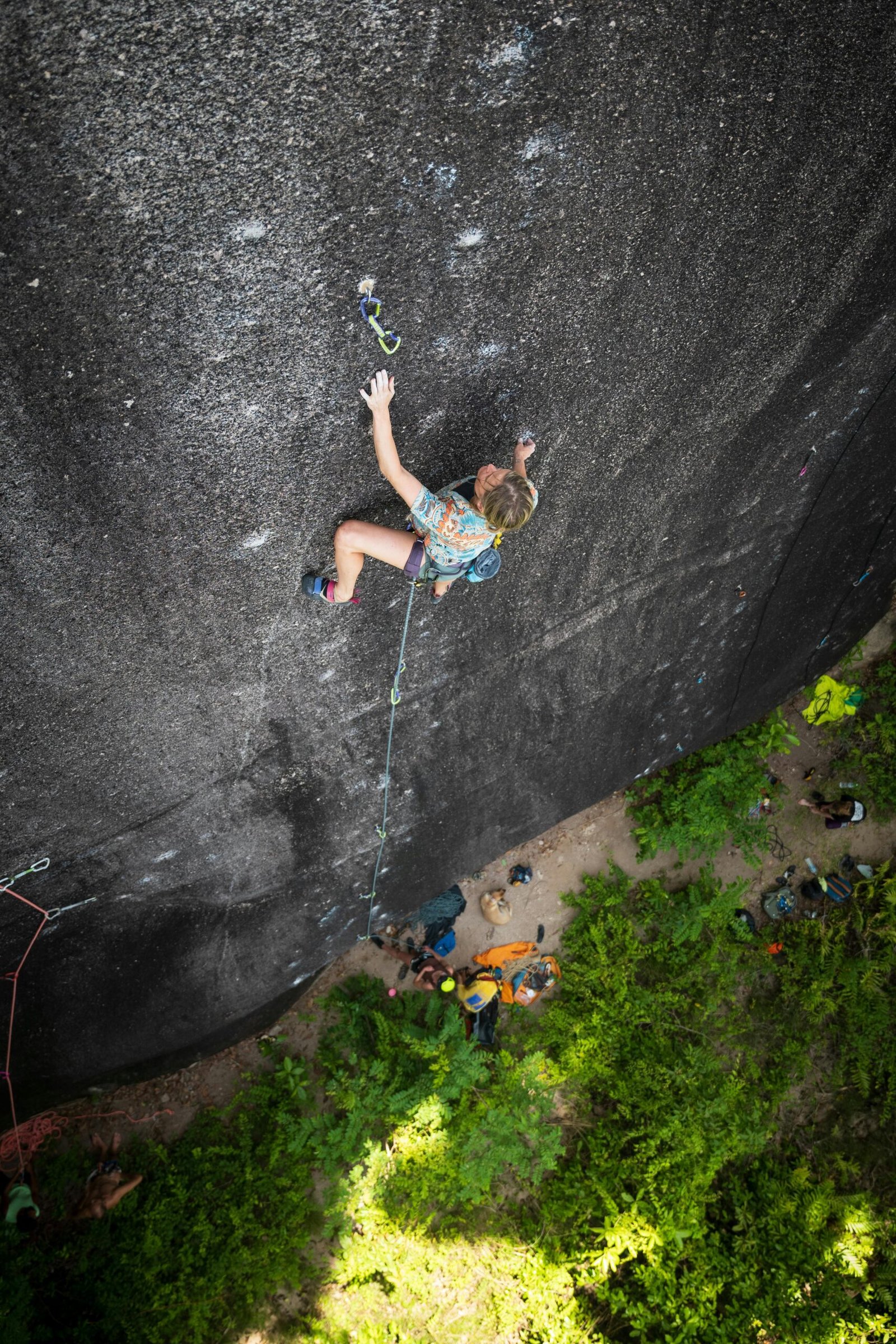
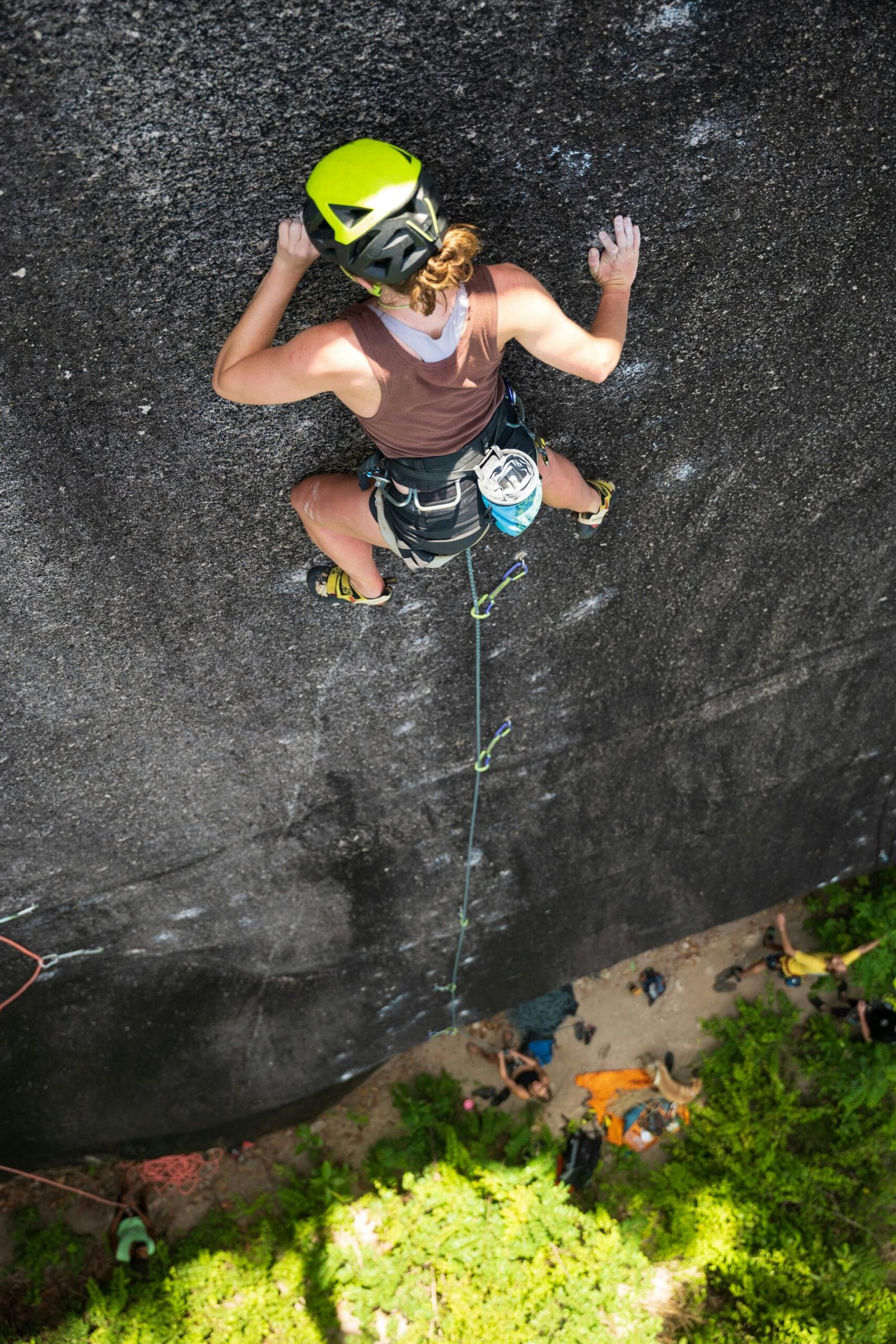
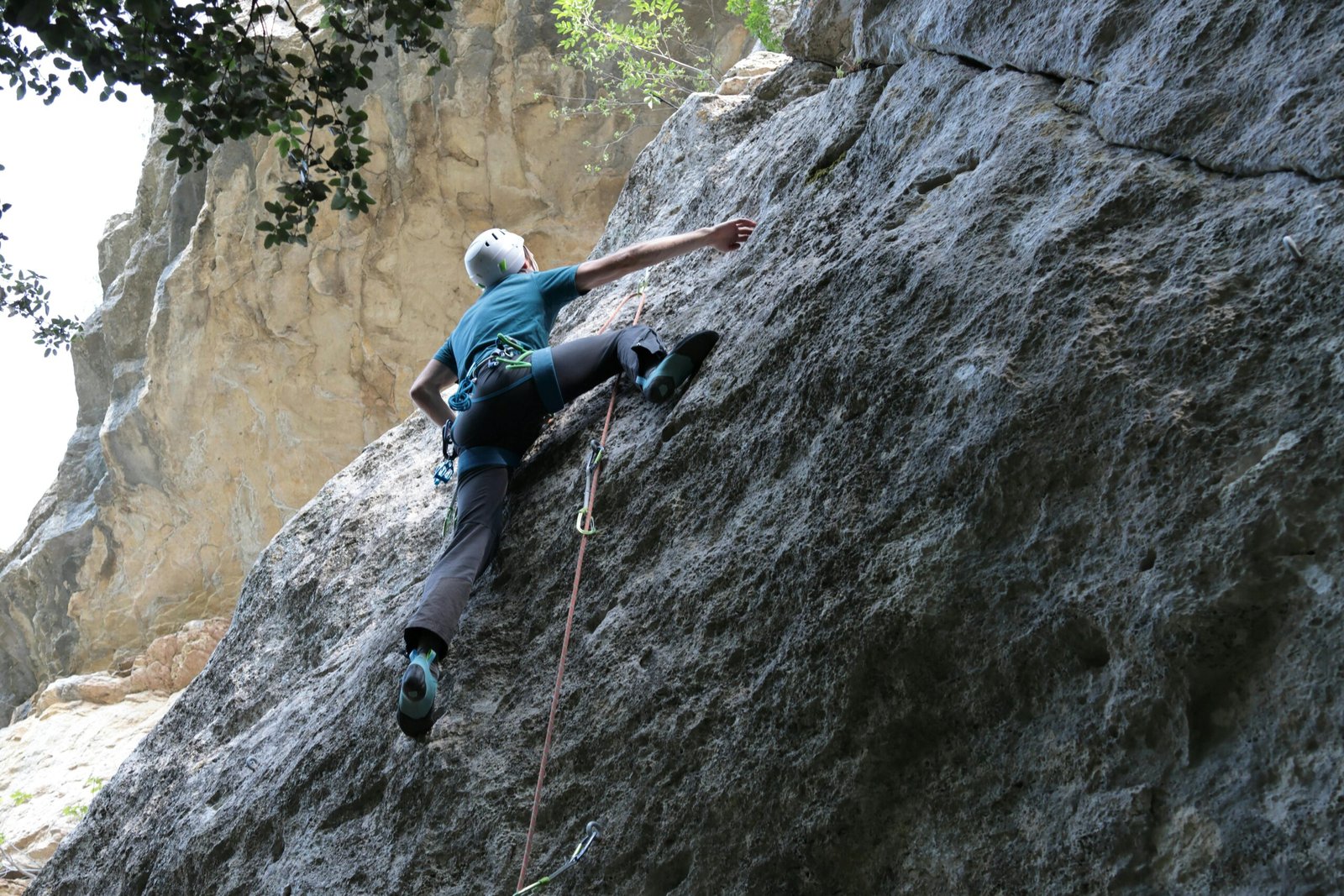
Want to get better at lead climbing? This thrilling discipline allows climbers to ascend routes while placing their own protection, combining physical strength with technical skill and mental resilience. Focusing on essential techniques like gear management, route navigation, and risk assessment is vital for enhancing your confidence and performance on the rock.
At Social Nature Movement, we offer specialised outdoor lead climbing courses tailored to climbers of various skill levels. Our courses provide hands-on experience with placing protection and understanding the dynamics of lead rope climbing in a natural setting. Under the guidance of our skilled instructors, participants learn how to assess risks and make informed decisions while climbing. This thorough approach ensures that you gain practical knowledge that is directly applicable to real-world climbing scenarios.
By joining our lead climbing course, you will not only develop your climbing techniques but also connect with a community of like-minded individuals who share your passion for the outdoors. Our supportive environment encourages climbers to challenge themselves while ensuring safety at all times. For more information about our outdoor lead climbing courses and to book your spot, visit the Social Nature Movement website today.
Check out our booking tab, click the book now button or fill an enquiry here.








This comprehensive Sport Climbing syllabus focuses on developing technical competence and leadership skills. From history and ethics to equipment usage, climbing techniques, safety management, and environmental responsibility, this qualification ensures a holistic approach to sport climbing education.
This changes depending on what we do and where we go, but generic items are:
If we are staying overnight, should you choose not to be accommodated and fed by us, here is what you will need:
All of the above is available to rent / hire / buy
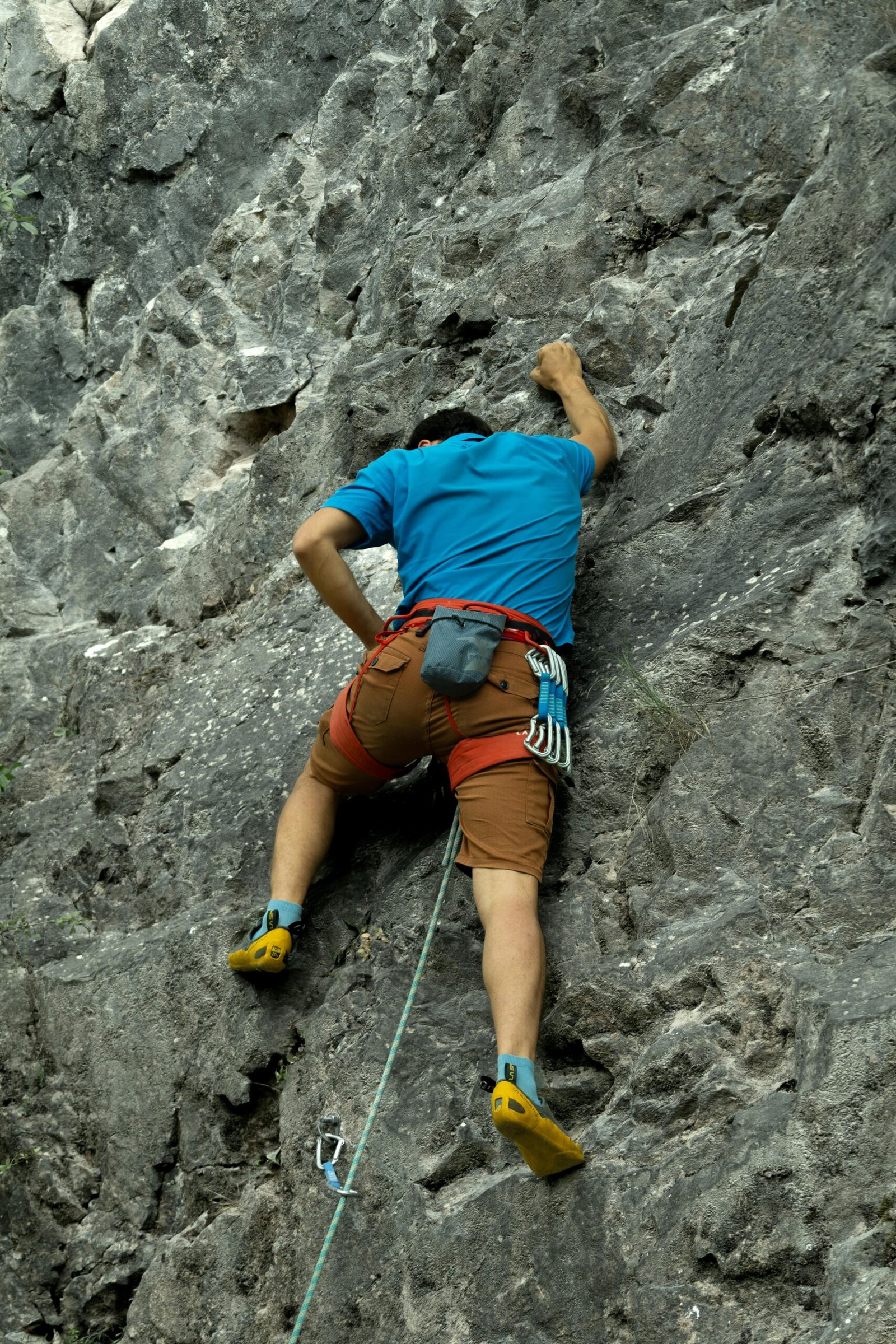
New Zealand Outdoor Instructors Association (NZOIA)
Lead climbing is not that hard, most people can learn how to lead climb with good progressions and quality instructors.
To get better at lead climbing one should seek professional assistance from a lead climbing instructor and go out wiht them to practice.
For beginner lead climbers, seek a professional lead climbing course.
No, because you need a lead belayer. Without one it is called free solo or rope solo climbing.
Rock climbing is harder for beginners who struggle with fear of heights, while bouldering is more of a challenge for beginners who lack finger and upper-body strength.
Like mock lead climbing, the best way to practice lead belaying is to have the climber still attached to a top rope, meaning that you will need a third person. With the climber secured to a top rope, the mock lead belayer can practice feeding slack without the pressure of catching the climber if they fall.
Z-clipping is when you clip the rope to your next bolt from below your last bolt or gear. This is most common on routes with bolts closely spaced and when the climber grabs blindly below their waist for the rope to make the next clip.
Lead climbing is relatively safe, it is as safe as the two people lead climbing and lead belaying. Accidents will usually occur due to user-error
We select the best staff for the job based on their skills, knolwedge and experiences. They will be an SNM staff member or we will bring in support from equally competent contractors. Sometimes we also bring in (semi)celebrity guests!
Adult
$300
Child
$270
Adult
$550
Child
$500
Adult
$1,000
Child
$900
Adult
$1,650
Child
$1,485
